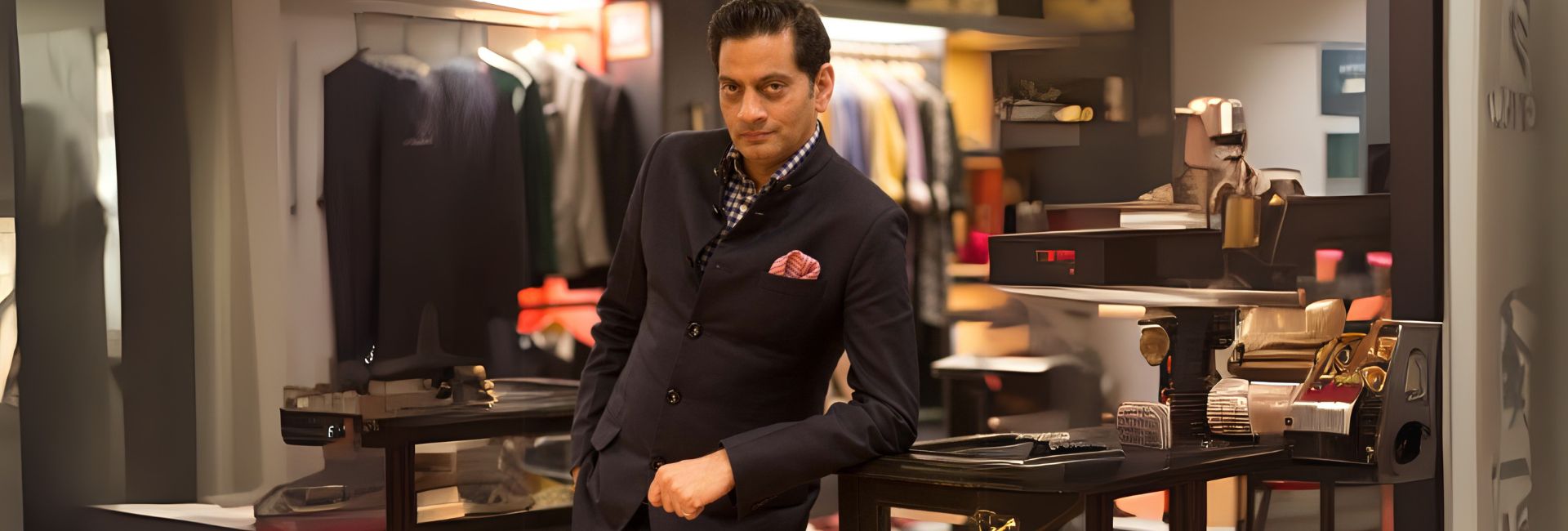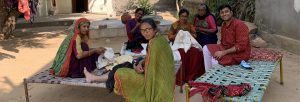(May 29, 2025) In his growing up years, Raghavendra Rathore would keenly watch his father’s wardrobe habits and the elegant lifestyle around him. Seeing him painstakingly choose ‘bandhgala achkans’ and breeches — fascinated the youngster, who comes from a royal lineage stretching back over 800 years.
It produced an early visual rhythm that eventually found expression in his design language, which captured the imagination of the rich and famous around the world. “My early years in Rajasthan set the groundwork for my current design philosophy,” smiles luxury lifestyle designer and hotelier Raghavendra Rathore, in a chat with Global Indian.
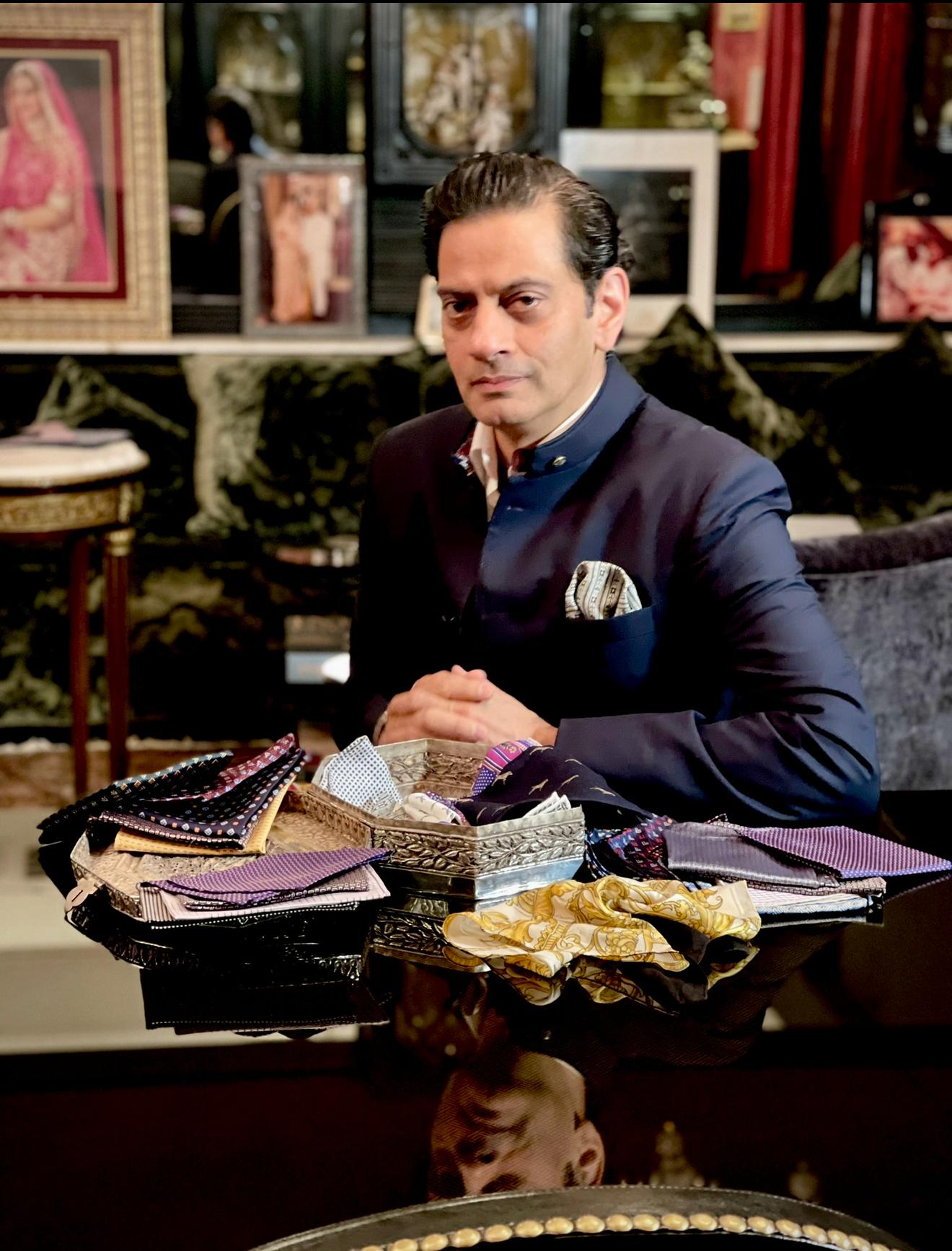
Raghavendra Rathore
From taking the Jodhpuri bandhgala and breeches to the global stage to designing the most elegant ensembles for the who’s who across the globe, Raghavendra Rathore’s work is elegance personified. One cannot expect it to be any other way from the descendent of Rao Jodha, the founder of Jodhpur.
Reviving heritage through bandhgala and breeches
More than just clothing, says Rathore, the bandhgala and breeches are cultural icons. “Thanks to decades of refining, adapting, and presenting these pieces, what started in Jodhpur as ceremonial clothing has now become associated with Indian elegance worldwide,” says the designer, whose clients are heads of state, royalty, and world’s tastemakers, who were presented timeless, structured designs that reflect quiet power, and not as ethnic wear.
From red carpets across continents to film events and weddings, Rathore brought the bandhgala to boardrooms. “This journey was not accidental; it was about realising the psychology of dressing, honouring legacy and heritage, and offering an aspirational Indian identity worldwide.”
Originally military-inspired, the breeches were resurrected with softer tailoring for contemporary life, says the founder of Bespoke and RR Blue brands.
Made in India, Worn by the world
Launching his first brand Bespoke in 1994, Rathore started with his tailored womenswear label and a decade later chose to launch Raghavendra Rathore Jodhpur, a menswear brand which is known globally for its classic bespoke tailored clothing.
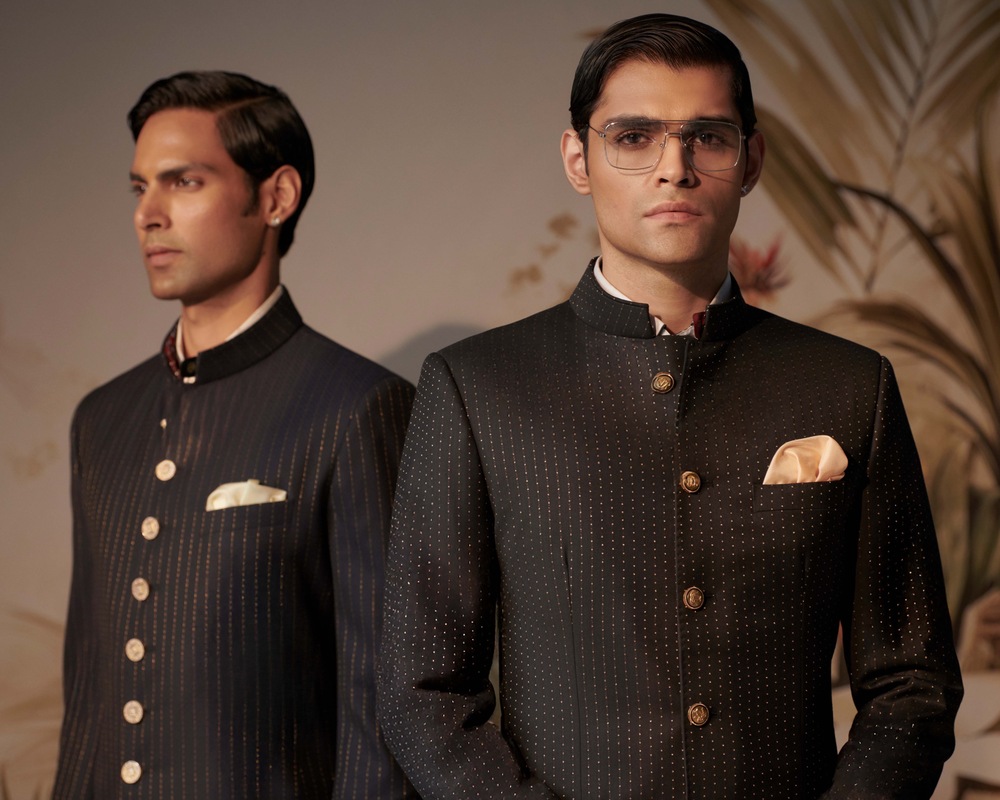
Well known for resurrecting the ‘Brand India’ strategy, Rathore coined his namesake label (RR Blue) as a ‘Made in India’ brand, translating traditional Indian ensembles for global clientele. “For me, Bespoke is about storytelling through fabric and fit, not about customising. RR Blue was born to make this available to a wider audience without endangering the legacy,” he says.
One of the many challenges he faced was bringing heritage clothes to the modern man which was not simple. “But staying true helped the brand carve a niche.”
Global icons, Indian couture
Rathore’s global clientele includes the Emir of Qatar, Duchess of York, actors Amitabh Bachchan, Saif Ali Khan and Indian cricketer Virat Kohli among others.
“Designing for the Emir of Qatar meant combining cultural modesty with regal flamboyance—deep jewel-toned bandhgalas, hand embroidery, and cuts suited to Qatari sensibilities,” elaborates Rathore.
For the Duchess of York, he says, it was about understated elegance, a mix of classic shapes with Indian detailing, highlighting the brand’s adaptability. “The look Amitabh Bachchan needed had gravitas and lineage — something only a custom achkan in classic ivory could provide,” explains Rathore, who designed 30 looks for Bachchan for the TV show Kaun Banega Crorepati.
Virat Kohli, says Rathore, was dressed in a modern rendition of the bandhgala, created with hand-textured fabric to honor both history and audacious uniqueness given his youthful and dynamic persona. “Every client brought unique expectations and personality. Many of our clients have commented on how our designs make them feel like royalty,” smiles the immensely talented designer.
Dressing stories across Bollywood and Hollywood
Rathore also designed costumes for Hollywood movies like The Gray Man and Bollywood films like Oh My God, Eklavya & Khoobsurat. “Hollywood and Bollywood have been two major venues to highlight Indian sartorial grace. Whether set in historical periods or needing royal aesthetics, we have worked on films where the story demanded authenticity in costumes,” he says.
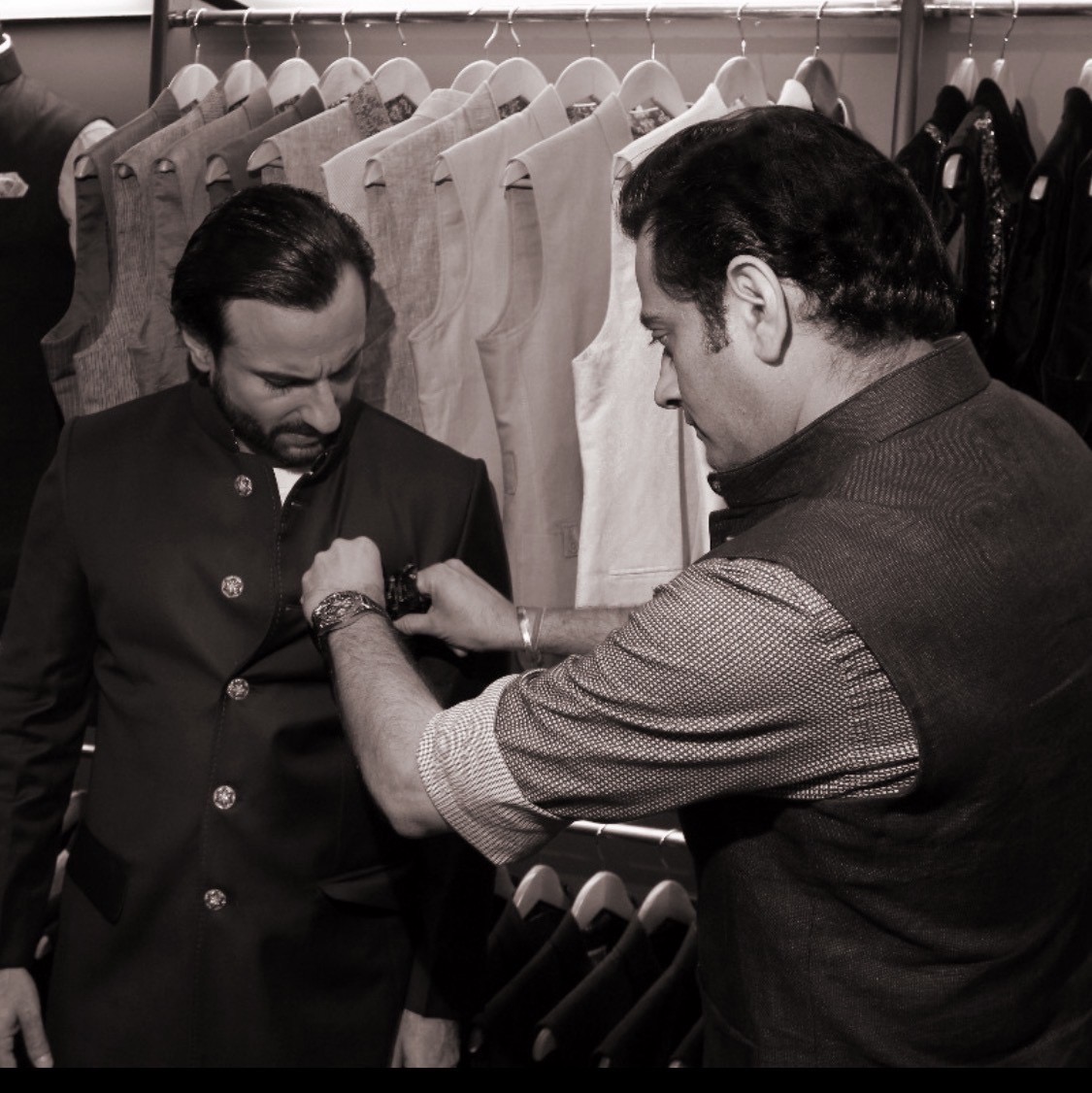
Saif Ali Khan and Raghavendra Rathore
While confidentiality limits naming all projects, some like Eklavya, The Gray Man and many others have been integral to his journey. “Working with directors, costume designers, and stylists brought our idea to life on screen. Every project needed careful study to strike a mix between accurate portrayal and character arcs,” informs Rathore, who is of the view that unlike ordinary couture, film costumes must tell a story rather than follow a trend. “Pleasure and difficulties, both have come from that.”
A royal childhood shaped by craft and culture
Rathore’s childhood was steeped in rich customs and culture, thanks to his royal lineage. “Growing up among centuries-old customs in the ladies’s wing (zenana) of our ancestral house, I was surrounded by women from my family who fervently engaged in art, design, and handcrafted traditions,” smiles Rathore, born in October 1967 and raised in Jodhpur.
His mother is related to family of the Maharaja of Kashmir, and has had an immense role to play in nurturing his creativity, sense of aesthetics and value for culture and heritage in his early years. “There used to be rare, well-chosen interactions with traders from Kashmir, Banaras, and even Europe — who would bring magnificent shawls, jewels, and embroidery to our private bazaars,” he recalls.
His father, Maharaj Swaroop Singh, then a legislative assembly member, would visit far-off communities and engage with craftspeople. “It exposed me to grassroots India.”
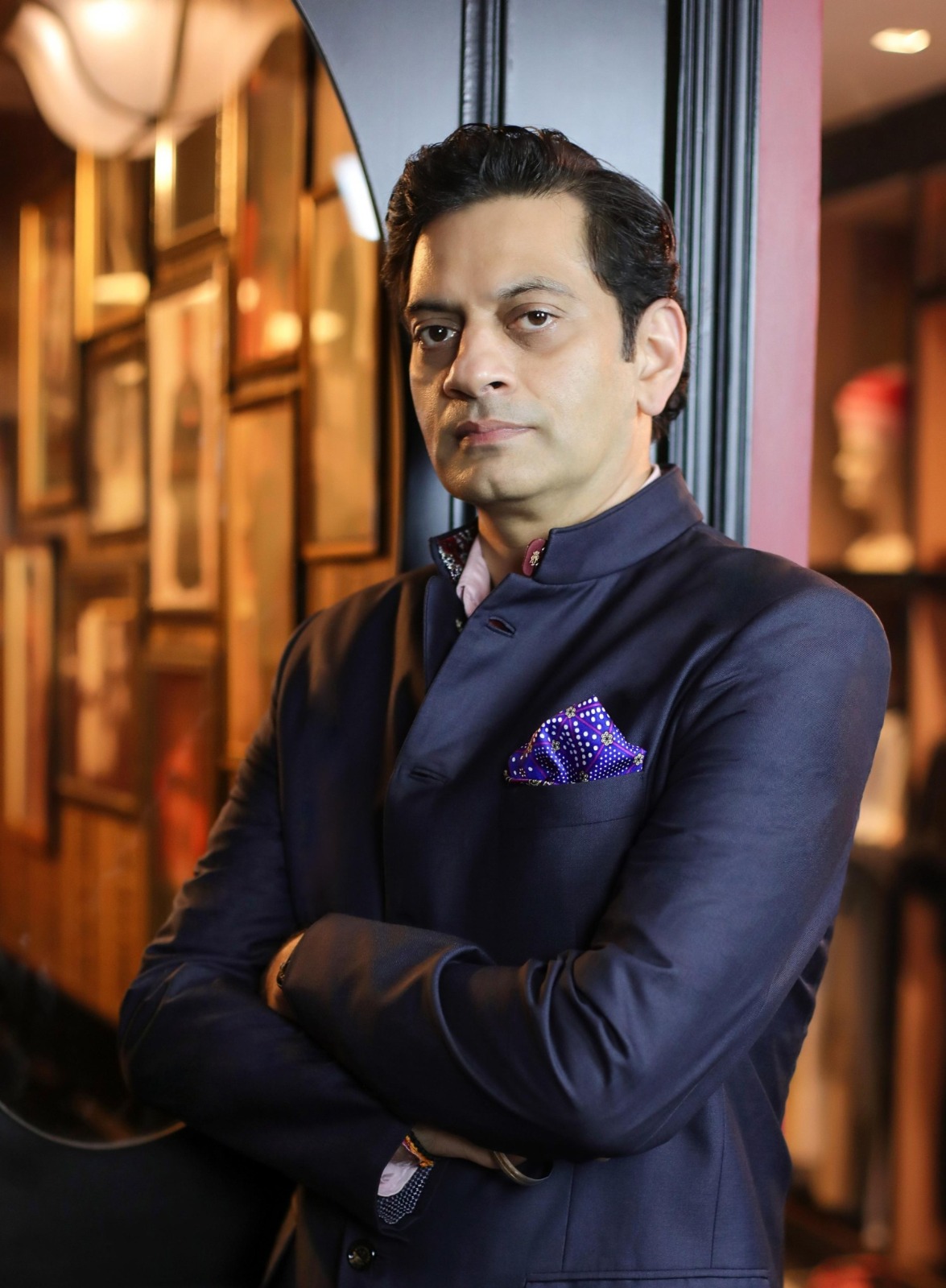
Shaped in New York. Rooted in India
After attending Mayo College, Ajmer, Rathore went to Hampshire College in Amherst, Massachusetts to study robotics. Thereafter, he studied arts and philosophy at the Marlboro College in Vermont, and went on to graduate from the Parsons School of Design in New York City, in 1992.
“Parsons in New York was rigorous; lessons in design, sketching, and presenting on real-life models developed discipline. The vitality of the city awakened me to the scene of world fashion,” recalls the royal scion adding that studying at Marlboro College have him a better understanding of philosophy, aesthetics, and independent thought.
Professionally, the spark started in New York. “I had had the good fortune to collaborate with Dominican fashion designer Oscar de la Renta and American fashion designer Donna Karan. That mix of mass market and couture helped me to get ready to go back to India.”
While Oscar de la Renta exposed Rathore to couture excellence, working as an assistant designer with Donna Karan gave him an understanding of the pulse of the fashion industry. In his course of work, he also interacted with people like Jacqueline Onassis, Elinor Lampard, and his grand aunt Maharani Gayatri Devi on account of the work that he used to do for Oscar de la Renta.
Paris couture. Indian conviction
Rathore then moved to Paris. “Paris was a dream—designing for Balmain, couture fashion show, and arranging the whole production using top French artisans and craft ship work, which finally shaped my dedication to legacy,” says Rathore.
View this post on Instagram
The experiences in the US and Paris empowered him to return to India and create something unique.
A royal debut at Mehrangarh
In 1994, Rathore’s cousin Gaj Singh, the Maharaja of Jodhpur, was celebrating 50 years of the Umaid Bhawan palace and asked him to put up a fashion show. “This was my first show at Mehrangarh Fort, which was held as part of the celebrations. It took me two months to put it together,” recalls Rathore, who was awarded by Government of Rajasthan for his contribution in the field of fashion design in 2012.
Rathore then launched his brand from a 500 square foot garage in Jodhpur. “Originally concentrating on womenswear, the brand developed into a completely bespoke menswear label organically,” he says.
Where India inspires, design follows
“India itself—its complexity, contradictions, and inventiveness—is my real inspiration,” says Rathore whose works are deeply ingrained in India’s diversity, colours, temperature, and stories.
“I learned resourcefulness from the desert and accuracy from the craftspeople. Every garment I create aims to be wearable and modern yet also preserve culture,” he says while highlighting that the beauty of little paintings, temple sculptures, and architecture always motivates him.
Among the designers, Rathore respects Yohji Yamamoto for poetic rebellion.
Hotelier by legacy. Designer by vision
Rathore has a family legacy of hospitality which meant that turning historical sites into well-chosen experiences came naturally to him.
“Being a hotelier is like being a designer; you satisfy the senses, guarantee quality, and foster emotional ties. Working with local communities, emphasising sustainable travel, and making sure our guests bring stories rather than just memories have been priorities,” says Rathore.
View this post on Instagram
Referring to Ajit Bhawan, an architectural grandeur built in 1927 as the private residence of Major General Maharaj Dhiraj Shri Ajit Singh Ji, the then PM of the princely state of Jodhpur and Rawla Narlai, a 17th-century manor, sitting in the shadow of a granite monolith in the village of Narlai, between the royal cities of Jodhpur and Udaipur — Rathore says it’s a combination of luxury boutique with history.
“It was about narrative, not only about rebuilding homes. With furniture, artwork, and textiles chosen for immersive stays, every room reflects a chapter of Rajasthan history,” he says.
The next chapter: legacy, scaled
The next ten years will help to democratise legacy, he says.
“We want the Bandhgala to be a mainstay for daily power dressing worldwide as well as for weddings. Tribal art, sustainability, and wellness travel are also under more attention lately,” informs Rathore, who also set up a design school — the Gurukul School of Design in Jaipur.
Beyond fashion, Rathore aims at entering lifestyle, education, and philanthropy. “I want to leave behind a structure that lets legacy be profitable, environmentally friendly, and appreciated all around.”
Beyond design: books, bites, and bazaars
“Books like The Substance of Style and India: A Sacred Geography motivate me as I enjoy reading about history, anthropology, and culture,” says Rathore who gravitates toward historical dramas and documentaries—The Crown, Chef’s Table, or vintage Merchant Ivory masterpieces.
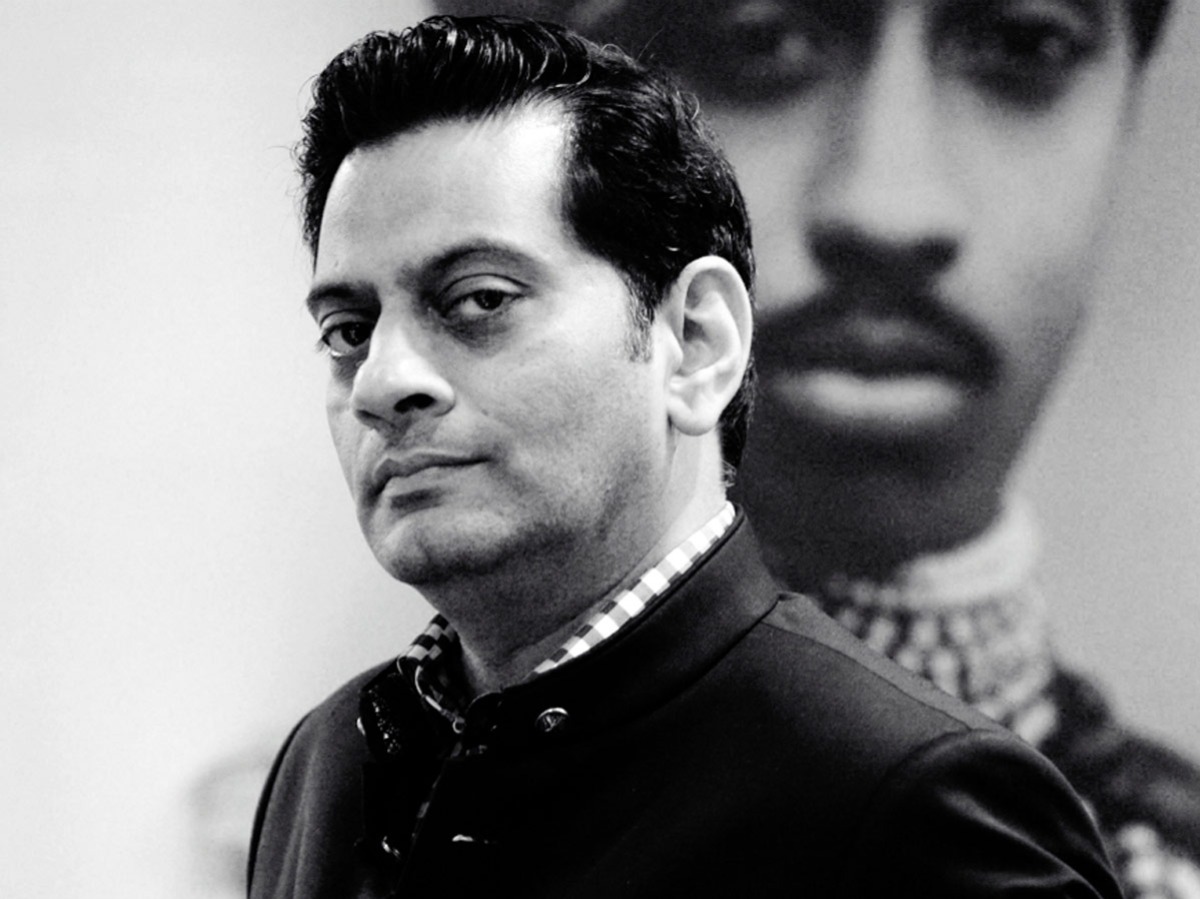
Raghavendra Rathore
Musically, he swings between Indian classical and French lounge.
Travel? “It is both business and fun; I enjoy going back to Kyoto, Marrakech, and Florence,” says the designer, who likes to tour flea markets all around the globe, fascinated by every item which, he feels, has a story just waiting to be told.
Another passion is food. “Simple but flavourful. I like to experiment with regional cuisine,” says the Rajasthan royal who loves to collect vintage items.
A designer with a painter’s heart
The first product he ever made apart from clothes was an art piece that sold at an Amfar (The Foundation for AIDS Research) gala outside of New York where he had Calvin Klein on one side and the world-famous artist Christo on the other side. The art piece called “Be Still My Beating Heart” sold for a great price. “I paint a lot as that’s my passion,” says Rathore who has commissioned more pieces of art.
Indian fashion, rising with purpose
Rathore feels Indian fashion has developed quite naturally. “Foreign labels used to represent success ten years ago; now, Indian workmanship and local stories are much valued. Particularly Generation Z is more conscious of environmental issues, legacy, and uniqueness,” he points out.
Thanks mostly to their marketing budgets, international brands still rule aspirational environments. “But India excels in its narrative depth. We shall not only compete but also lead if Indian designers keep combining quality with narrative,” he concludes.
- Follow Raghavendra Rathore on Instagram
ALSO READ | 25 years of Sabyasachi: The designer who brought Indian heritage to the world

